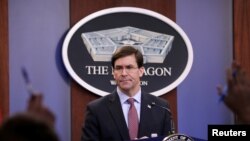ສະຫະລັດຈະບໍ່ຖອນທະຫານອອກຈາກອີຣັກ, ນັ້ນຄືຄຳເວົ້າ ຂອງທ່ານມາກຄ໌ ແອສເພີ (Mark Esper), ລັດຖະມົນຕີກະຊວງປ້ອງກັນປະເທດ ທີ່ກ່າວໃນວັນຈັນວານນີ້ ໂດຍທີ່ຫົວໜ້າຜູ້ບັນຊາການກອງທັບຂອງສະຫະລັດທ່ານນີ້ອະທິບາຍວ່າ ຈົດໝາຍຂອງເຈົ້າໜ້າທີ່ຂັ້ນສູງທ່ານນຶ່ງທີ່ປາກົດສະເໜີວ່າ ໃຫ້ຖອນທະຫານນັ້ນ ເປັນການຂຽນຄຳເວົ້າທີ່ຜິດຫລາຍ.
ທ່ານ ແອສເພີ (Esper) ກ່າວວ່າ "ບໍ່ມີການຕັດສິນໃຈໃດໆ ທີ່ຈະອອກຈາກອີຣັກເລີຍ." ທ່ານກ່າວຢ້ຳອີກວ່າ "ບໍ່ໄດ້ມີການຕັດສິນໃຈທີ່ຈະອອກໄປຈາກອີຣັກ ແລະພວກເຮົາກໍບໍ່ໄດ້ວາງແຜນອັນໃດອອກມາ ວ່າຈະອອກຈາກຫັ້ນເລີຍ."
ຈົດໝາຍທີ່ສົ່ງໄປຫາລັດຖະບານອີຣັກ ຈາກຜູ້ບັນຊາການທະຫານທ່ານນຶ່ງຢູ່ໃນອີຣັກ ໄດ້ຖືກນຳເອົາໄປລົງເຜີຍແຜ່ຢູ່ໃນທວີດເຕີໃນວັນຈັນວານນີ້. ຢູ່ໃນນັ້ນ ຜູ້ບັນຊາການທະຫານທ່ານນັ້ນຂຽນວ່າ ສະຫະລັດນັບຖື “ການຕັດສິນໃຈຂອງອີຣັກທີ່ສັ່ງໃຫ້ພວກເຮົາອອກໄປ” ແລະຂຽນວ່າ ທະຫານສະຫະລັດຈະ "ຈະປ່ຽນບ່ອນປະຈຳການຢູ່ໃນບໍ່ເທົ່າໃດມື້ ແລະເທົ່າໃດອາທິດຕໍ່ໜ້ານີ້ ເພື່ອກະກຽມໃຫ້ແກ່ການເຄື່ອນໄຫວໄປຂ້າງໜ້າ.”
ນາຍພົນ ມາກຄ໌ ມີລລີ (Mark Milley), ປະທານເສນາທິການຮ່ວມ ກ່າວຕໍ່ ພວກນັກຂ່າວໃນວັນຈັນວານນີ້ວ່າ ຈົດໝາຍສະບັບດັ່ງກ່າວເປັນພຽງແຕ່ຮ່າງຈົດໝາຍເທົ່ານັ້ນ ທີ່ສົ່ງໃຫ້ພັນທະມິດອີຣັກ ເພື່ອໃຫ້ເຂົາເຈົ້າອອກຄຳຄິດເຫັນ ແລະເພື່ອໃຫ້ມີການປະສານງານໃນການສື່ສານກັນ.
ທ່ານມີລລີ (Milley) ເວົ້າວ່າ "ມັນຜິດ, ເປັນຄວາມຜິດທີ່ຊື່ສັດຈິງໃຈ, ເປັນຮ່າງຈົດໝາຍທີ່ບໍ່ມີລາຍເຊັນ ເພາະວ່າ ພວກເຮົາກຳລັງເຄື່ອນກຳລັງໄປມາ ແລະ ພວກເຮົາໄດ້ເພີ້ມການເຄື່ອນໄຫວຂອງເຮືອບິນເຮລີຄອບເຕີຂຶ້ນ.”
ທ່ານກ່າວເພີ້ມອີກວ່າ ຮ່າງຈົດໝາຍນັ້ນ "ຂຽນໂດຍໃຊ້ຄວາມເວົ້າບໍ່ຖືກຕ້ອງຫລາຍ" ແລະ "ມີຄວາມໝາຍທີ່ຄ້າຍໆວ່າ ເປັນການຖອນທະຫານ."
ທ່ານມີລລີ (Milley) ເວົ້າອີກວ່າ "ສິ່ງທີ່ວ່ານັ້ນ ບໍ່ແມ່ນສິ່ງທີ່ກຳລັງທີ່ເປັນຢູ່ໃນເວລານີ້ເລີຍ.”
ເຢຍຣະມັນທີ່ມີທະຫານປະມານ 120 ຄົນ ຢູ່ໃນອີຣັກ ເພື່ອຊ່ວຍຝຶກກຳລັງທະຫານອີຣັກ ກ່າວໃນວັນອັງຄານມື້ນີ້ວ່າ ຕົນມີແຜນທີ່ຈະເຄື່ອນທະຫານປະມານ 30 ຄົນ ອອກຈາກແບັກແດດ ແລະຕາຈີ ເພື່ອໄປຢູ່ໃນຈໍແດນ ແລະຄູເວດ ຍ້ອນເປັນຫ່ວງດ້ານຄວາມປອດໄພ ທ່າມກາງຄວາມເຄັ່ງຕຶງທີ່ເພີ້ມທະວີຂຶ້ນຢູ່ໃນຂົງເຂດດັ່ງກ່າວ. ບັນດາເຈົ້າໜ້າທີ່ເຢຍຣະມັນເວົ້າວ່າ ພວກທະຫານສາມາດກັບຄືນມາອີກໄດ້ ຖ້າເມື່ອໃດຫາກມີການຝຶກທະຫານຄືນອີກ.
ທ່ານ ແອສເພີ (Esper) ແລະ ທ່ານມີລລີ (Milley) ຍັງໄດ້ສົນທະນາກັນອີກວ່າ ການຕັດສິນໃຈຂອງພວກເພິ່ນໃນການສັງຫານທ່ານກາສເຊມ ຊູເລມານີ, ຜູ້ນຳກອງກຳລັງໜ່ວຍອາລກຸດຂອງອີຣ່ານ ຢູ່ໃນການໂຈມຕີໃນອາທິດແລ້ວນີ້ ຊຶ່ງທັງສອງທ່ານຢືນຢັດວ່າ ທ່ານຊູເລມານີໄດ້ວາງແຜນ ທີ່ຈະໂຈມຕີຊາວອາເມຣິກັນ.
ອ່ານຂ່າວນີ້ເພີ້ມເປັນພາສາອັງກິດຢູ່ລຸ່ມນີ້
The United States is not withdrawing troops from Iraq, Defense Secretary Mark Esper said Monday, with the top U.S. military officer explaining that a letter from a senior military officer that appeared to suggest withdrawal was a poorly worded mistake.
"There's been no decision whatsoever to leave Iraq," Esper said. "There's no decision to leave, nor did we issue any plans to leave."
A letter circulated Monday on Twitter had been sent to the Iraqi government from a commander in Iraq. In it, the commander said the U.S. respects Iraq's "decision to order our departure" and that U.S. troops would be "repositioning over the course of the coming days and weeks to prepare for onward movement."
General Mark Milley, the Chairman of the Joint Chiefs of Staff, told reporters Monday that the letter was merely a draft sent to Iraqi allies for input and in order to coordinate the language.
"It was a mistake, an honest mistake, a draft unsigned letter because we are moving forces around and we have increased helicopter movement," Milley said.
He added that the draft letter was "poorly worded" and "implies withdrawal."
"That is not what's happening," Milley said.
Milley added that he had just spoken on the phone with General Kenneth "Frank" McKenzie, who used "words that were a little more colorful than mistake'" to describe the letter while assuring the top general that "nobody's leaving" Iraq.
Esper and Milley also discussed their decision to kill Iranian Quds Force leader Qassem Soleimani in a strike last week, with both asserting that he was planning attacks on Americans.
"He was planning, coordinating and synchronizing significant combat operations against U.S. military forces in the region, and it was imminent," Milley said, adding that decision-makers would have been "culpably negligent to the American people" had they not struck Soleimani.
No evidence has been presented to reporters of the potential attacks.
Esper, when asked if he would target cultural sites in Iran, said that the U.S. military would "follow the laws of armed conflict," which prohibit such attacks.





